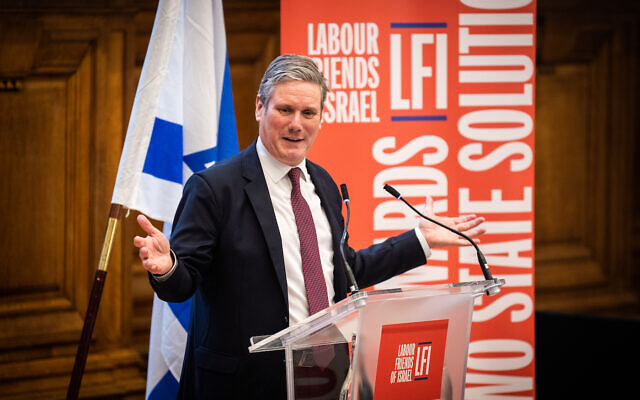OPINION: Do you truly support the two-state solution?
Matan Rosenstrauch, an Israeli peace activist living in London, argues that you can only support the two-state solution if you recognise both the Palestinian and Jewish right to self-determination.

If you support the two-state solution (2SS) and feel worried about the future of Israel as a democracy, this is a necessary read for you.
I recently met with Labour Friends of Israel. Being a pro-Israeli lobby group, which is “committed to a two-state solution” and operates inside a political party which recognises both peoples’, Israelis’ and Palestinians’ rights for self-determination, I was intrigued to understand whether they are a “pro-Israel pro-peace” group in the way Yachad is, or if they support the 2SS in a similar way to that which StandWithUs and other hasbara groups do?
Meaning: they say they support it, but they don’t. Before the meeting, I looked at LFI’s view on the recent elections and found a tweet saying they were “appalled that 10% of voters backed the racist, homophobic far-right parties of Ben-Gvir and Smotrich”. But will this new reality of Jewish supremacists in the Knesset change their policy in any way? This might be wishful thinking.

In the conversation with LFI, I discovered they support Israel, the state, not the government. So, what happens when the elected government of that state acts unapologetically against the 2SS, a solution which the international community, including the political party LFI operates within, supports? Would this change their support for Israel? Again. Wishful thinking.
In 2017, when I was working with South Africa’s Jewish community to start the Jewish Democratic Initiative, a pro-Israel pro-peace group, I realised how the South African Zionist Federation uses the 2SS as a fig leaf: they said that they supported the 2SS, but that there was no partner for peace.
Or that the Palestinians would never accept Israel as a Jewish state. We are all too familiar with Hasbara arguments which put the spotlight away from Israel and its responsibility for the occupation. Yes, Israel. The occupier, the powerful side in this conflict, which controls the very situation it can decide to end. But it does not.
Many waters (or maybe, not enough) have flowed down the Jordan since those years, and Netanyahu’s famous Bar Ilan speech in 2009, in which he supported the 2SS publicly.
Netanyahu’s government has slowly moved away from using the “support of 2SS, but…” into conflict management and expansion of the occupation. This is a core reason for the rift between Israel and the Jewish diaspora, and this rift is growing bigger and bigger, with Israel’s shift towards a Jewish apartheid state.
When Israel dropped the 2SS… under the radar
Do you remember the exact time that happened, when Israel’s government stopped saying they support the 2SS? Probably not, because it was never publicly announced. It was made under the radar. The Jewish establishments in the Diaspora, Hasbara organisations and LFI, however, haven’t changed that line. Why would they? It would sabotage their work in “defending” Israel.
Just like for most Israelis, it’s easier to believe you support the 2SS and in the same breath explain why it has not happened (and why it probably won’t happen soon, nor ever). I doubt, however, Hasbara groups believe that. They simply use it for their propaganda purposes. If it has worked for so many years, why would you change strategy?
Well, with Ben Gvir and Smortich in power, it’s the perfect timing to uncover some truths: Israel’s government supports a one Jewish only state; and, those who claim to support the 2SS but recognise only one people’s right for self-determination, actually support a one state solution. Don’t be fooled by this contradiction.
Netanyahu’s government has slowly moved away from using the “support of 2SS, but…” into conflict management and expansion of the occupation.
In October 2014, the UK House of Commons passed a motion which called on the government to recognise Palestine as an independent state. In June 2021, Labour leader Keir Starmer pressed Prime Minister Boris Johnson to recognise a Palestinian state during the G7 talks in Cornwall, though in November that year he knew how not to upset the pro-Israeli, yet probably not too pro-peace, LFI members at their annual lunch: the policy of recognition was ignored that night.
As they hope it will be in a future Labour government. But will it? The UK should fund shared society initiatives, but not recognise Palestine?
LFI would label people who oppose the settlements as anti-Israeli. By doing so, they strengthen the zero-sum game of the conflict: you are either with us or against us. They would also draw attention to other burning issues beside the occupation, which is not a burning issue for them. They would also say they don’t see how recognising Palestine can help at all.
Seeing this conflict as an internal (rather an international) issue, they would advocate the UK government to fund shared society non-governmental initiatives. Yes, that would surely make a political change. We saw this change in the last election.
And about any “political” intervention – please mind your own business. It’s almost like they work for the Israeli embassy. Am I to blame for conspiracy? They sound, simply, the same.
I could have sat there with StandWithUs and heard similar messages. They say they support the 2SS but they don’t. They work to perpetuate the occupation. I’ve said it to them and I am writing it again now.
They help to shut down criticism of Israel, and there’s plenty of antisemitism in the Labour party (blurred with being “obsessed with the occupation”, as they see it) to work with, while the new Israeli government is working to Judify Eretz Israel. Mind your own business and let Israel do its work.
You can only support the 2SS if you recognise both peoples’ right for self-determination. If you don’t recognise Palestine alongside Israel, you support a one state with rights only for the Jews.
In which case, you can join LFI. Or, you might as well join CFI, as they are more of the same.

Thank you for helping to make Jewish News the leading source of news and opinion for the UK Jewish community. Today we're asking for your invaluable help to continue putting our community first in everything we do.
For as little as £5 a month you can help sustain the vital work we do in celebrating and standing up for Jewish life in Britain.
Jewish News holds our community together and keeps us connected. Like a synagogue, it’s where people turn to feel part of something bigger. It also proudly shows the rest of Britain the vibrancy and rich culture of modern Jewish life.
You can make a quick and easy one-off or monthly contribution of £5, £10, £20 or any other sum you’re comfortable with.
100% of your donation will help us continue celebrating our community, in all its dynamic diversity...
Engaging
Being a community platform means so much more than producing a newspaper and website. One of our proudest roles is media partnering with our invaluable charities to amplify the outstanding work they do to help us all.
Celebrating
There’s no shortage of oys in the world but Jewish News takes every opportunity to celebrate the joys too, through projects like Night of Heroes, 40 Under 40 and other compelling countdowns that make the community kvell with pride.
Pioneering
In the first collaboration between media outlets from different faiths, Jewish News worked with British Muslim TV and Church Times to produce a list of young activists leading the way on interfaith understanding.
Campaigning
Royal Mail issued a stamp honouring Holocaust hero Sir Nicholas Winton after a Jewish News campaign attracted more than 100,000 backers. Jewish Newsalso produces special editions of the paper highlighting pressing issues including mental health and Holocaust remembrance.
Easy access
In an age when news is readily accessible, Jewish News provides high-quality content free online and offline, removing any financial barriers to connecting people.
Voice of our community to wider society
The Jewish News team regularly appears on TV, radio and on the pages of the national press to comment on stories about the Jewish community. Easy access to the paper on the streets of London also means Jewish News provides an invaluable window into the community for the country at large.
We hope you agree all this is worth preserving.





















